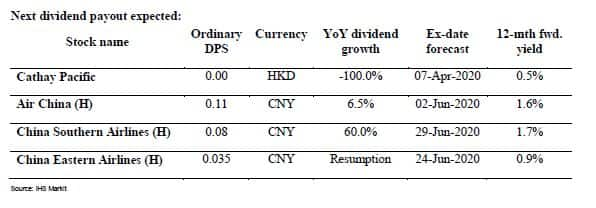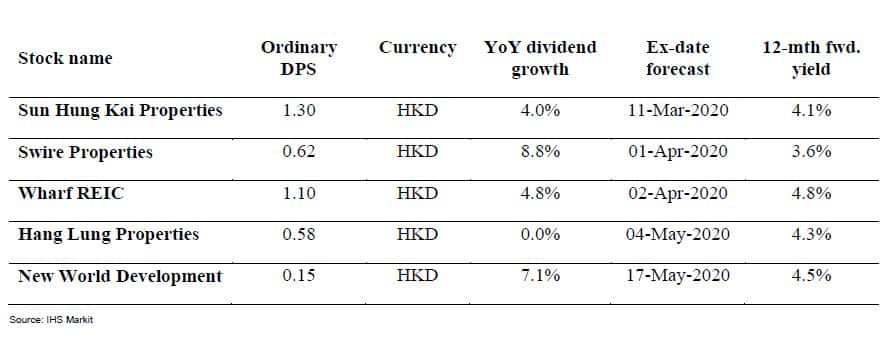Customer Logins
Obtain the data you need to make the most informed decisions by accessing our extensive portfolio of information, analytics, and expertise. Sign in to the product or service center of your choice.
Customer Logins
PUBLICATION
Nov 13, 2019
Protests to weigh on Hong Kong SAR's dividend outlook
Earnings estimates for companies in travel & leisure, retail and real estate sectors were directly impacted by the protests and have been sharply revised downwards over the past three months. Notably, street analysts continue to cut earnings estimates for over 70% of the constituents in these three sectors. For travel & leisure, recent data show that 60% of the constituents saw a 5% or greater cut in consensus earnings compared to the projections three months ago. Similarly, 30% of the companies in retail and property sectors have their earnings estimates cut by at least 5% over the same period. However, we are still expecting dividends to grow by 6% and 8% respectively in 2019 and 2020, mostly attributed to the banking sector and real estate sector. The projected increase in dividends over these two years is modest compared to the growth rates registered in 2017 and 2018, during which dividends grew by double digits.
Travel & Leisure Industry
Aggregate dividends from this industry are expected to grow at a
slower pace in 2020, with a 0.6% increase, compared to the 15.8%
growth rate estimated for 2019. Top dividend contributors in this
industry are expected to increase dividends slightly or maintain
stable dividend payouts.
We expect that Cathay Pacific Airways will suspend its upcoming
dividend. According to recent releases from Cathay Pacific, the
flag carrier of Hong Kong experienced a decrease in both the number
of passengers and the amount of cargo and mail carried in August
and September compared to same period last year. The most
significant drop comes from mainland China. In its passenger
business, revenue passenger kilometers dropped by 28.1% and 23.2%
yoy in mainland China in August and September respectively, the
largest drop among all regions. Cathay Pacific's cargo and mail
revenue tonne also showed a 14.0% and 4.4% yoy drop in August and
September respectively. The proportion of revenue from the mainland
has increased in recent years, with almost 50% of its revenue
generated from mainland China in FY18.  The large variance across Cathay Pacific's projected
earnings for FY19 suggests a significant amount of uncertainty in
its outlook, underpinning our low confidence flag for the upcoming
2nd interim dividend estimate. We expect that Cathay Pacific will
suspend its dividend as latest earnings projections suggest that
they could generate a loss in the second half of FY19. Our
expectation is consistent with the poor performance reported in
their latest filing. Earnings prospects remain bleak in the short
term, with management expecting the upcoming months to be
challenging due to the weak demand for travel following the
protests. We note that when Cathay Pacific underperformed in the
second half of FY16, it suspended its final dividend.
The large variance across Cathay Pacific's projected
earnings for FY19 suggests a significant amount of uncertainty in
its outlook, underpinning our low confidence flag for the upcoming
2nd interim dividend estimate. We expect that Cathay Pacific will
suspend its dividend as latest earnings projections suggest that
they could generate a loss in the second half of FY19. Our
expectation is consistent with the poor performance reported in
their latest filing. Earnings prospects remain bleak in the short
term, with management expecting the upcoming months to be
challenging due to the weak demand for travel following the
protests. We note that when Cathay Pacific underperformed in the
second half of FY16, it suspended its final dividend.
Retail Industry
The aggregate dividends from the retail industry are expected to
grow 6.4% to HKD 11.7 billion in 2020, supported by stable
dividends from well-known retail enterprises, as well as the fast
growth in dividends from a few education companies. In 2016, total
dividends from education related companies accounted for
approximately 2% of the aggregate dividends in the retail sector,
and we expect their contribution to jump to 20% in 2020. The
expected slowdown in growth from other retail companies, which are
negatively affected by the macro economic uncertainties and the
social unrests in Hong Kong, are likely to keep a lid on the growth
of payouts from this sector. Notably, we are expecting Chow Tai
Fook Jewellery and Luk Fook Holdings to decrease their upcoming
payouts by 6.7% and 18.2% on a year-on-year basis.  Real Estate Industry
Real Estate Industry
Dividend growth from the real estate sector is expected to moderate
in 2020. The deceleration in growth of payouts from companies in
mainland China can be attributable to the tightening property
measures implemented in recent years. The limited upside potential
in dividends from Hong Kong property firms can be attributed to the
weak macro environment and the prolonged political unrest.
Companies with large retail and hotel portfolios, such as Sun
Hung Kai Properties, Swire Properties and Wharf REIC are expected
to suffer the most from the protests. The undercut in tourist
spending will affect the ability of retail tenants to afford rent
and will lead to lower hotel occupancy. For example, in their
latest annual report, the management of Sun Hung Kai expressed
their concern that weakening consumer sentiment and declining
tourist spending have posed challenges in the retail market for
recent months. Property rental and hotel operations contributed to
30% of Sun Hung Kai Properties' total revenue in FY2019, and some
of its major shopping malls such as IFC Mall and The Sun Arcade are
at the storm eye of the ongoing protest. 
To access the report, please contact dividendsupport@ihsmarkit.com
Maojun Ye, CFA, Principal Research Analyst at IHS
Markit
Qianwen Ruan, FRM, Senior Research Analyst II at
IHS Markit
Yang Yang, CFA, Senior Research Analyst I at IHS
Markit
S&P Global provides industry-leading data, software and technology platforms and managed services to tackle some of the most difficult challenges in financial markets. We help our customers better understand complicated markets, reduce risk, operate more efficiently and comply with financial regulation.
This article was published by S&P Global Market Intelligence and not by S&P Global Ratings, which is a separately managed division of S&P Global.
{"items" : [
{"name":"share","enabled":true,"desc":"<strong>Share</strong>","mobdesc":"Share","options":[ {"name":"facebook","url":"https://www.facebook.com/sharer.php?u=http%3a%2f%2fprod.azure.ihsmarkit.com%2fmarketintelligence%2fen%2fmi%2fresearch-analysis%2fprotests-to-weigh-on-hong-kong-dividend-outlook.html","enabled":true},{"name":"twitter","url":"https://twitter.com/intent/tweet?url=http%3a%2f%2fprod.azure.ihsmarkit.com%2fmarketintelligence%2fen%2fmi%2fresearch-analysis%2fprotests-to-weigh-on-hong-kong-dividend-outlook.html&text=Protests+to+weigh+on+Hong+Kong+SAR%27s+dividend+outlook+%7c+S%26P+Global+","enabled":true},{"name":"linkedin","url":"https://www.linkedin.com/sharing/share-offsite/?url=http%3a%2f%2fprod.azure.ihsmarkit.com%2fmarketintelligence%2fen%2fmi%2fresearch-analysis%2fprotests-to-weigh-on-hong-kong-dividend-outlook.html","enabled":true},{"name":"email","url":"?subject=Protests to weigh on Hong Kong SAR's dividend outlook | S&P Global &body=http%3a%2f%2fprod.azure.ihsmarkit.com%2fmarketintelligence%2fen%2fmi%2fresearch-analysis%2fprotests-to-weigh-on-hong-kong-dividend-outlook.html","enabled":true},{"name":"whatsapp","url":"https://api.whatsapp.com/send?text=Protests+to+weigh+on+Hong+Kong+SAR%27s+dividend+outlook+%7c+S%26P+Global+ http%3a%2f%2fprod.azure.ihsmarkit.com%2fmarketintelligence%2fen%2fmi%2fresearch-analysis%2fprotests-to-weigh-on-hong-kong-dividend-outlook.html","enabled":true}]}, {"name":"rtt","enabled":true,"mobdesc":"Top"}
]}



